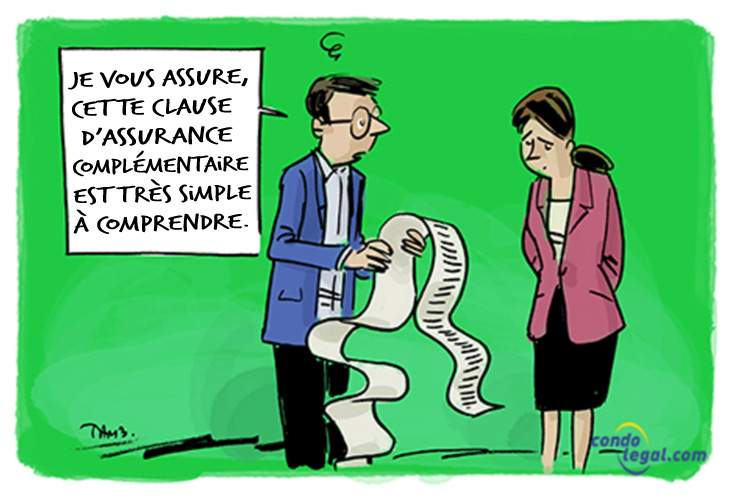Co-owner's liability insurance
 A co-owner may be liable to the syndicate, the other co-owners and the occupants of the immovable. As stated in Article 1457 of the Civil Code of Québec, every person has a duty not to harm others. As a co-owner, you must be careful and abide to the appropriate rules of conduct in accordance with the context and circumstances. Otherwise, you engage your civil liability and are required to remedy (financially third parties for moral or property damage and personal injury. This is why co-owners must take out civil liability insurance covering in particular claims arising from their private portion.
A co-owner may be liable to the syndicate, the other co-owners and the occupants of the immovable. As stated in Article 1457 of the Civil Code of Québec, every person has a duty not to harm others. As a co-owner, you must be careful and abide to the appropriate rules of conduct in accordance with the context and circumstances. Otherwise, you engage your civil liability and are required to remedy (financially third parties for moral or property damage and personal injury. This is why co-owners must take out civil liability insurance covering in particular claims arising from their private portion.
Multiple risks
Civil liability insurance protects you against your own damaging act or omission. This insurance covers many situations:
- The occupants: It covers your civil liability for damages occurring in your home, such as if your tenant (or other occupants) suffer bodily injury caused by a defective electrical appliance.
- The property under your custody: It also protects you against damages caused to neighbours or third parties by the property under your custody. You should know that any person is bound to make reparation for the prejudice that his property has caused to a third party under the provisions of article 1465 of the Civil Code of Québec. For example, if the hot water tank in your private portion leaks, you may be held responsible for the damages to the movable property of your neighbours or their improvements.
- The tenants: Furthermore, if you lease your apartment, you should subscribe civil liability insurance to protect yourself from the risks of the tenancy. To this end, many declarations of co-ownership provide that the co-owners are jointly and severally responsible for the damages caused by their tenant.
As an owner- landlord, it is in your best interest to require that your tenant subscribes civil liability insurance. To justify your requirement, you should explain that if he is responsible for a loss, this insurance will protect him against the claims of the co-owners and of the syndicate or even from the insurers who have paid out indemnities to their insured.
The insurance deductible of the syndicate
Civil liability insurance covers damages caused by the occupants of your private portion or by yourself to the common or private portions. This coverage includes the losses which are not covered by the insurer of the syndicate, such as the deductible of the building insurance of the co-ownership. For example, if the deductible is $50 000 and the damages $75 000, the insurer will pay only an indemnity of $25,000.
In this case the syndicate is entitled to claim the amount of the damages for which he has not been indemnified ($50,000) from the co-owner at fault, who will in turn be reimbursed by its civil liability insurance, if any. This insurance is therefore crucial and it is foolhardy to be without it. In fact, this coverage will protect a co-owner from having to pay, out of his own funds, damages of many thousands of dollars.
Obligation to insure
The liability insurance of the co-owners became mandatory (Art.1064.1 of the Civil Code of Quebec) on October 15, 2020. It covers the responsibility of co-owners towards third parties. Most declarations of co-ownership require co-owners to take out and maintain third person liability insurance, whether or not they reside in the building.
They must also prove that this insurance is still in force - each time they renew their insurance contract or change insurers - by submitting an insurance certificate to their Board of Directors.The co-ownership declaration may also specify the amount of coverage. This insurance is not only intended to protect the co-owners, it also allows the syndicate and co-owners to be adequately covered, in the event that a co-owner causes damage to the building.
What is covered by liability insurance?
Generally included in a home insurance contract, liability insurance covers the payment of compensation in the event of accidental damage caused to third parties. These indemnities are paid to those who are victims (syndicate, co-owners and other occupants of the building), in order to pay for bodily injury or property damage that people have suffered. Unless otherwise provided in the insurance contract, insurance coverage (guarantee) is limited to the actual cash value of the insured property on the day of the loss. Thus, the indemnity paid by the insurer of the co-owner to the syndicate, for the sums below the deductible, will be established on the cost of reconstruction at the time of the disaster minus a reasonable depreciation.
Amount of coverage
Section 1 of the Insurance Regulation, published in the Gazette officielle du Québec on April 15th, 2020, stipulates that the minimum amount of liability insurance that a co-owner must hold is:
- 1 million, if the building has fewer than 13 fractions used or capable of being used as a housing unit or for carrying on a business;
- 2 million, if the building has 13 or more fractions.
Furthermore, the Declaration of Co-ownership may impose on each co-owner an amount of coverage greater than that provided for in the regulation. Therefore, the co-owners are required to comply with the provisions of the Declaration of Co-ownership.
 WHAT YOU SHOULD KNOW! Under the terms and conditions of a civil liability insurance policy, the insurer usually has the obligation to assume your defence, under certain conditions, when a civil liability lawsuit is instigated against you. This coverage pays the lawyers’ fees and other legal costs.
WHAT YOU SHOULD KNOW! Under the terms and conditions of a civil liability insurance policy, the insurer usually has the obligation to assume your defence, under certain conditions, when a civil liability lawsuit is instigated against you. This coverage pays the lawyers’ fees and other legal costs.
 WHAT TO KEEP IN MIND: Every co-owner should be insured for the risks inherent to his civil liability, irrespective of being an occupant or not. This insurance offers protection from third parties (for example: the neighbours) and from the co-ownership, from any claim not covered by the insurance of the syndicate, and more particularly the deductible.
WHAT TO KEEP IN MIND: Every co-owner should be insured for the risks inherent to his civil liability, irrespective of being an occupant or not. This insurance offers protection from third parties (for example: the neighbours) and from the co-ownership, from any claim not covered by the insurance of the syndicate, and more particularly the deductible.
 WARNING! Failing subscribing civil liability insurance, you will stand alone against civil liability claims. It is therefore in your best interest and in the best interest of your syndicate to subscribe this insurance.
WARNING! Failing subscribing civil liability insurance, you will stand alone against civil liability claims. It is therefore in your best interest and in the best interest of your syndicate to subscribe this insurance.
Return to the super factsheet Insurance of the co-owner
Back to the factsheets





